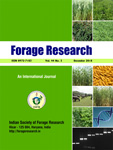PUNESH SANGWAN, VINOD KUMAR*, RITU, KIRAN, SUNIL KUMAR, TAMANNA, SUSHIL NAGAR AND NEERAJ KHAROR
Department of Biochemistry, College of Basic Sciences & Humanities, CCS HAU, Hisar -125004 (Haryana), India Department of Genetics & Plant Breeding (Forage Section), CCS HAU, Hisar-125004 (Haryana), India Department of Botany, CRM Jat College, Hisar -125004 (Haryana), India
Department of Biotechnology, Central University of Haryana, Jant-Pali, Mahendergarh (Haryana), India Current affiliation: FMD Laboratory, Department of Veterinary Microbiology, LUVAS,
Hisar -125004 (Haryana), India
(e-mail: sangwan.vinod@hau.ac.in)
(Received : 1 July 2023; Accepted : 30 July 2023)
SUMMARY
Iron (Fe) is an important micronutrient for plant growth and it has several functions. A large portion of agricultural soils around the world has low Fe-availability to plants due to its unavailable forms or varying nature of soils including calcareous soils. The deficiency of Fe led to adverse effects on plant growth and agricultural productivity. It has got recent attention and molecular, biochemical, physiological responses of plants under Fe deficiency is being reported in some crops. To understand the mechanism of Fe deficiency tolerance, this review provides an overview of such studies.
Key words: Fe-deficiency, calcareous soils, phytosiderophores, Superoxide dismutase

